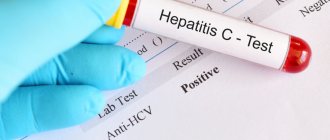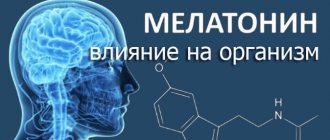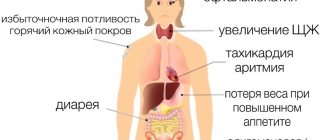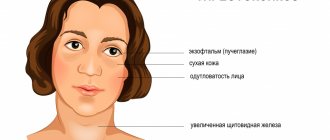Description
Synonyms (rus): Autoantibodies to thyroid-stimulating hormone receptors, thyroid-stimulating immunoglobulin
Synonyms (eng): Thyroid-stimulating immunoglobulins, TSIs, Thyroid-stimulating hormone receptor antibodies, TSH receptor antibodies, TSHRAbs, TSH binding inhibitor immunoglobulin, TBII, TRAb
Biomaterial: Venous blood
Indicator(s): Antibodies to thyroid-stimulating hormone receptor
Method(s): Enzyme -linked immunosorbent assay (ELISA)
Container type and preanalytical features: Biochemical tube with coagulation activator, 6 ml (red or brown cap)
The thyroid-stimulating hormone receptor is a glycoprotein of two subunits (alpha and beta), expressed on the surface of the follicular cells of the thyroid gland, responsible for regulating its function. The interaction of TSH with the receptor leads to the production of thyroid hormones and the growth of thyroid follicular cells. In case of increased receptor activation, excess hormone synthesis and cell growth occur, which leads to thyrotoxicosis and goiter formation. The main reason for receptor hyperactivation is the formation of stimulating antibodies that bind to the receptor extracellular alpha subunit. In general, antibodies to the TSH receptor can be divided into 3 categories: stimulating, blocking and neutral. It should be noted that all three types of antibodies can be present in one patient. The cause of Graves' disease is an autoimmune process with the formation of stimulating antibodies to the TSH receptor. The pathogenetic role of these antibodies was first proven in 1956, when DD Adams reproduced the clinical picture of Graves' disease by injecting plasma from the patient. Since the TSH receptor is located, in addition to thyroid cells, also on fibroblasts, adipocytes and lymphocytes, one of the symptoms of the disease is ophthalmopathy, manifested by protrusion of the eyeball and inflammation of the membranes of the eye, which is associated with the binding of antibodies to these cells in the retrobulbar tissue. Blocking antibodies, interacting with the surface beta subunit, prevent the receptor from interacting with TSH. This leads to a decrease in thyroid function, the formation of hypothyroidism and atrophy of the thyroid gland. These antibodies are detected in patients with Hashimoto's atrophic thyroiditis. The presence of blocking antibodies in Graves' disease may cause fluctuations in thyroid function in such patients. Neutral antibodies are directed to epitopes located outside the TSH binding site, so they do not have a blocking effect. Their pathogenetic role is unknown. Testing for antibodies to the TSH receptor is necessary if Graves' disease is suspected in pregnant women. It is important to note that these antibodies can cross the placental barrier and affect the fetal thyroid gland. Thus, stimulating antibodies cause the development of transient hypothyroidism in the newborn, while blocking antibodies cause transient hypothyroidism. An important role is played by the determination of antibodies to assess the risk of relapse in patients treated with thyreostatics. The presence of a high concentration of antibodies in the blood is considered a marker of a high risk of relapse. The methods used in laboratory practice do not allow one to distinguish between the presence of stimulating or blocking antibodies in the blood. The LATS test used for these purposes is complex and labor-intensive, which makes it difficult to use in routine research. The specificity of the test reaches 100%, since antibodies to the TSH receptor are almost never found in healthy people. However, the sensitivity of the test is about 80%, which is due to the low concentration of antibodies in the blood serum. Thus, a negative test result does not rule out the disease.
Detection of autoantibodies to thyroid-stimulating hormone receptors in blood serum, used to diagnose Graves' disease (Graves' disease), autoimmune thyroiditis, as well as transient dysfunction of the thyroid gland in newborns.
Synonyms Russian
Autoantibodies to thyroid-stimulating hormone receptors, thyroid-stimulating immunoglobulin.
English synonyms
Thyroid-stimulating immunoglobulins, TSIs, Thyroid-stimulating hormone receptor antibodies, TSH receptor antibodies, TSHRAbs, TSH binding inhibitor immunoglobulin, TBII.
Research method
Electrochemiluminescent immunoassay (ECLIA).
Determination range: 0.3 - 40 IU/l.
Units
IU/L (international unit per liter).
What biomaterial can be used for research?
Venous blood.
How to properly prepare for research?
Do not smoke for 30 minutes before the test.
General information about the study
Antibodies to TSH receptors (anti-tSH) are a heterogeneous group of autoantibodies that interact with the thyroid stimulating hormone (TSH) receptors of the thyroid gland. Based on their effect on thyroid function, anti-pTTH is divided into stimulating and blocking antibodies. Stimulating anti-pTTHs greatly enhance thyroid function, leading to diffuse goiter and hyperthyroidism. Anti-pTTH blockers interfere with the action of TSH and lead to thyroid atrophy and hypothyroidism. Anti-rTSH are predominantly immunoglobulins of the IgG class and penetrate the placental barrier. Both variants can be detected simultaneously in the blood of the same patient. They are the direct cause of Graves' disease and autoimmune thyroiditis, as well as transient thyroid dysfunction in newborns. A test for antibodies to TSH receptors is a diagnostic test that detects both stimulating and blocking antibodies in the blood.
Anti-rTSH is a clinical and laboratory marker of Graves' disease and is studied in the differential diagnosis of hyperthyroidism syndrome. The presence of anti-rTSH is not typical for other causes of hyperthyroidism, such as toxic nodular goiter, granulomatous thyroiditis, or administration of exogenous thyroxine. Stimulating anti-rTSHs are found in 85-100% of patients with Graves' disease and can serve as a diagnostic criterion. Anti-rTSH concentration reflects disease activity and is associated with the severity of ophthalmopathy. The significance of this test is especially great if the disease has an atypical clinical picture: signs of hyperthyroidism, vaguely palpable goiter, ophthalmopathy against the background of euthyroidism, unilateral ophthalmopathy. The concentration of anti-rTSH decreases when antithyroid drugs are prescribed, and a high rate of titer decline indicates a good response to treatment. The dynamics of anti-rTSH may serve as a basis for adjustment of therapy, including complete withdrawal of antithyroid drugs. In 75-96% of cases of Graves' disease, blocking anti-rTSH is also found. It should be noted that anti-rTSH is not a strictly specific finding for Graves' disease and may also be found in 10-15% of patients with Hashimoto's autoimmune thyroiditis.
The anti-rTSH test plays an important role in the diagnosis of Graves' disease in pregnant women. The danger of Graves' disease during pregnancy is that anti-rTSH crosses the placental barrier and leads to hyperthyroidism in the newborn. Radionuclide scanning of the thyroid gland, one of the main ways to diagnose Graves' disease, is not prescribed to pregnant women. In this situation, anti-rTSH testing is a good alternative to thyroid scintigraphy. Anti-rTSH concentrations are measured in pregnant women with a history of surgery for Graves' disease or radioactive iodine treatment, and in women receiving antithyroid drugs during pregnancy. Like stimulating anti-rTSH, blocking antibodies cross the placenta and can cause transient hypothyroidism in the newborn. For timely diagnosis of autoimmune hypothyroidism in pregnant women, an anti-rTSH test is performed.
In half of the cases of Graves' disease, a relapse of the disease occurs after completing a course of thyreostatic drugs. When assessing the prognosis of relapse, several parameters are used, such as the size of the goiter, the age and gender of the patient, the presence of ophthalmopathy and the level of anti-rTSH. High levels of anti-rTSH are considered to be an unfavorable prognostic factor.
Graves' disease and autoimmune thyroiditis may coexist with other autoimmune conditions such as systemic lupus erythematosus, pernicious anemia, and rheumatoid arthritis. Therefore, if the anti-rTSH test result is positive and autoimmune thyroid disease is diagnosed, it is recommended to conduct additional laboratory tests to exclude concomitant pathology.
What is the research used for?
- For differential diagnosis of hyper- and hypothyroidism syndrome.
- To monitor the treatment of relapse of Graves' disease and make its prognosis.
- To predict the development of transient thyroid dysfunction in newborns.
When is the study scheduled?
- For symptoms of hyperthyroidism: irritability, restlessness, tremor, feeling of irregular heartbeat, oligoamenorrhea, weight loss despite increased appetite, sensitivity to heat, especially in the presence of ophthalmopathy (exophthalmos) and pretibial myxedema of the skin.
- With an atypical clinical picture of Graves' disease: unexpressed signs of hyperthyroidism, vaguely palpable goiter, ophthalmopathy against the background of euthyroidism, unilateral ophthalmopathy.
- For symptoms of hypothyroidism: weakness, drowsiness, impaired concentration and memory, weight gain despite decreased appetite, increased sensitivity to cold, etc.
- When examining pregnant women with a history of surgical treatment of Graves' disease or treatment with radioactive iodine, as well as pregnant women receiving thyreostatic drugs.
- When examining pregnant women with signs of hypothyroidism.
What do the results mean?
Reference values
| Result | |
| ≤ 1.75 IU/l | negative |
| > 1.75 IU/l | positive |
Reasons for the positive result:
- Graves' disease (Bazedow);
- autoimmune thyroiditis.
Reasons for negative results:
- absence of autoimmune thyroid diseases;
- disease control during treatment.
What can influence the result?
- The concentration of anti-rTSH decreases due to the use of thyrotoxic drugs.
Interpretation
Normally, the level of antibodies in the blood is ≤ 1.75 IU/L. A negative result may indicate the absence of the disease, a low risk of relapse and control of the disease during therapy. At the same time, it should be remembered that a negative result in this case does not exclude the disease. A positive result (> 1.75 IU/L) almost always indicates the development of Graves' disease, since these antibodies are rarely found in healthy individuals. In newborns, this result may indicate transient thyrotoxicosis/hypothyroidism, and in individuals who have been treated for Graves' disease, it may indicate a high risk of relapse when combined with other indicators. In some cases, the presence of antibodies to the thyroid-stimulating hormone receptor has been noted in patients with Hashimoto's thyroiditis.
Antibodies to the TSH receptor (anti-pTTH)
Detection of autoantibodies to the thyroid-stimulating hormone receptor in blood serum, used to diagnose Graves' disease (Graves' disease), autoimmune thyroiditis, as well as transient dysfunction of the thyroid gland in newborns.
Synonyms Russian
Autoantibodies to thyroid-stimulating hormone receptors, thyroid-stimulating immunoglobulin.
English synonyms
Thyroid-stimulating immunoglobulins, TSIs, Thyroid-stimulating hormone receptor antibodies, TSH receptor antibodies, TSHRAbs, TSH binding inhibitor immunoglobulin, TBII.
Research method
Enzyme-linked immunosorbent assay (ELISA).
Units
IU/L (international unit per liter).
What biomaterial can be used for research?
Venous blood.
How to properly prepare for research?
Do not smoke for 30 minutes before donating blood.
General information about the study
Anti-TSH receptor antibodies (anti-rTTH) are a heterogeneous group of autoantibodies that interact with the thyroid stimulating hormone (TSH) receptors of the thyroid gland. Based on their effect on thyroid function, anti-pTTH is divided into stimulating and blocking antibodies. Stimulating anti-pTTHs greatly enhance thyroid function, leading to diffuse goiter and hyperthyroidism. Anti-pTTH blockers interfere with the action of TSH and lead to thyroid atrophy and hypothyroidism. Anti-TSH are predominantly classified as immunoglobulins of the IgG class and penetrate the placental barrier. Both variants can be detected simultaneously in the blood of the same patient. They are the direct cause of Graves' disease and autoimmune thyroiditis, as well as transient thyroid dysfunction in newborns. A test for antibodies to the TSH receptor is a diagnostic test that detects both stimulating and blocking antibodies in the blood.
Anti-TSH are a clinical and laboratory marker of Graves' disease and are studied in the differential diagnosis of hyperthyroidism syndrome. The presence of anti-TSH is not typical for other causes of hyperthyroidism, such as toxic nodular goiter, granulomatous thyroiditis, or administration of exogenous thyroxine. Stimulating anti-rTSHs are found in 85-100% of patients with Graves' disease and can serve as a diagnostic criterion. The anti-TSH concentration reflects disease activity and is associated with the severity of ophthalmopathy. The significance of this test is especially great if the disease has an atypical clinical picture: signs of hyperthyroidism, vaguely palpable goiter, ophthalmopathy against the background of euthyroidism, unilateral ophthalmopathy. The anti-TSH concentration decreases when antithyroid drugs are prescribed, and a high rate of titer decline indicates a good response to treatment. The dynamics of anti-TSH may serve as a basis for adjustment of therapy, including complete withdrawal of antithyroid drugs. In 75-96% of cases of Graves' disease, blocking anti-rTSH is also found. It should be noted that anti-rTSH is not strictly specific for Graves' disease and may also be found in 10-15% of patients with autoimmune Hashimoto's thyroiditis.
Anti-rTSH testing plays an important role in the diagnosis of Graves' disease in pregnant women. The danger of Graves' disease during pregnancy is that anti-rTSH crosses the placental barrier and leads to hyperthyroidism in the newborn. Radionuclide scanning of the thyroid gland, one of the main ways to diagnose Graves' disease, is not prescribed to pregnant women. In this situation, anti-TSH testing is a good alternative to thyroid scintigraphy. Anti-rTSH concentrations are measured in pregnant women with a history of surgery for Graves' disease or radioactive iodine treatment, and in women receiving antithyroid drugs during pregnancy. Like stimulating anti-TSH, blocking antibodies cross the placenta and can cause transient hypothyroidism in the newborn. For timely diagnosis of autoimmune hypothyroidism in pregnant women, an anti-TSH test is performed.
In half of the cases of Graves' disease, a relapse of the disease occurs after completing a course of thyreostatic drugs. When assessing the prognosis of relapse, several parameters are used, such as the size of the goiter, the age and gender of the patient, the presence of ophthalmopathy and the level of anti-TSH. A high anti-TSH level is considered an unfavorable prognostic factor.
Graves' disease and autoimmune thyroiditis may coexist with other autoimmune conditions such as systemic lupus erythematosus, pernicious anemia, and rheumatoid arthritis. Therefore, if the anti-rTSH test result is positive and autoimmune thyroid disease is diagnosed, it is recommended to conduct additional laboratory tests to exclude concomitant pathology.
What is the research used for?
- For differential diagnosis of hyper- and hypothyroidism syndrome.
- To monitor the treatment of relapse of Graves' disease and make its prognosis.
- To predict the development of transient thyroid dysfunction in newborns.
When is the study scheduled?
- For symptoms of hyperthyroidism: irritability, restlessness, tremor, feeling of irregular heartbeat, oligoamenorrhea, weight loss despite increased appetite, sensitivity to heat, especially in the presence of ophthalmopathy (exophthalmos) and pretibial myxedema of the skin.
- With an atypical clinical picture of Graves' disease: unexpressed signs of hyperthyroidism, vaguely palpable goiter, ophthalmopathy against the background of euthyroidism, unilateral ophthalmopathy.
- For symptoms of hypothyroidism: weakness, drowsiness, impaired concentration and memory, weight gain despite decreased appetite, increased sensitivity to cold, etc.
- When examining pregnant women with a history of surgical treatment of Graves' disease or treatment with radioactive iodine, as well as pregnant women receiving thyreostatic drugs.
- When examining pregnant women with signs of hypothyroidism.
What do the results mean?
Reference values: 0 - 0.99 IU/l.
Reasons for the positive result:
- Graves' disease (Graves's disease);
- autoimmune thyroiditis.
Reasons for negative results:
- absence of autoimmune thyroid diseases;
- disease control during treatment;
- incorrect blood collection for testing.
What can influence the result?
- The concentration of anti-TSH decreases due to the use of thyrotoxic drugs.
Important Notes
- The result of the study should be interpreted taking into account additional clinical, laboratory and instrumental data.
- A negative result does not completely exclude the disease.
Also recommended
- Thyroid-stimulating hormone (TSH)
- Free thyroxine (free T4)
- Free triiodothyronine (free T3)
- Total thyroxine (T4)
- Total triiodothyronine (T3)
- Antibodies to thyroid peroxidase (anti-TPO)
- Antithyroglobulin antibodies (antiTG)
- Detailed laboratory examination of the thyroid gland
- Thyroid function
Who orders the study?
Endocrinologist, general practitioner, cardiologist.
Literature
- Cho BY. Clinical applications of TSH receptor antibodies in thyroid diseases. J Korean Med Sci. 2002 Jun;17(3):293-301.
- Michalek K, Morshed SA, Latif R, Davies TF. TSH receptor autoantibodies. Autoimmun Rev. 2009 Dec;9(2):113-6.
- Fauci et al. Harrison's Principles of Internal Medicine/A. Fauci, D. Kasper, D. Longo, E. Braunwald, S. Hauser, J. L. Jameson, J. Loscalzo; 17 ed. – The McGraw-Hill Companies, 2008.
- Chernecky CC Laboratory Tests and Diagnostic Procedures / S.S. Chernecky, V.J. Berger; 5th ed. – Saunder Elsevier, 2008.
Bibliography
- Lapin S.V. Totolyan A.A. Immunological laboratory diagnosis of autoimmune diseases. Publishing house "Man", St. Petersburg - 2010
- Tietz Clinical guide to laboratory tests. 4th ed. Ed. Wu ANB- USA, WB Sounders Company, 2006, 1798 p.
- Conrad K, Schlosler W., Hiepe F., Fitzler MJ Autoantibodies in Organ Specific Autoimmune Diseases: A Diagnostic Reference/PABST, Dresden – 2011.
- Conrad K, Schlosler W., Hiepe F., Fitzler MJ Autoantibodies in Systemic Autoimmune Diseases: A Diagnostic Reference/PABST, Dresden – 2007.
- Gershvin ME, Meroni PL, Shoenfeld Y. Autoantibodies 2nd ed./ Elsevier Science – 2006.
- Shoenfeld Y., Cervera R, Gershvin ME Diagnostic Criteria in Autoimmune Diseases / Humana Press – 2008.
- Tozzoli, R., Bagnasco, M., & Villalta, D. Thyrotropin Receptor Antibodies / Autoantibodies, 375–383 - 2014
- Weetman, A. P. (2014). Thyroid disease. / The Autoimmune Diseases, 557–574 - 2014.
- Test system manufacturer's instructions
Particular inflammation. What is autoimmune thyroiditis?
When the immune system “takes arms” against normal organs and tissues of the body, we speak of an autoimmune disease. One of these pathologies is autoimmune thyroiditis. We talked about it with the endocrinologist at the Expert Clinic in Rostov-on-Don, Aida Nizamovna Gyulmagomedova.
— Aida Nizamovna, what is autoimmune thyroiditis?
- This is a specific inflammation of the thyroid gland. With this disease, antibodies to the iron are detected in the body. I will give some information about her.
The thyroid gland itself is small, but it is the largest endocrine gland in our body. It consists of two lobes and an isthmus and is shaped like a butterfly. True, sometimes there is an additional, pyramidal, lobe. Each lobe is approximately the size of the nail phalanx of a human thumb. On average, the volume of the thyroid gland in women does not exceed 18 milliliters, in men - no more than 25. It is important to note that the lower limit of its size does not exist today: it can be very small, but at the same time perform its functions properly - in sufficient quantity produce hormones.
Autoimmune thyroiditis was first described by the Japanese physician Hashimoto in 1912, so the disease also has another name - Hashimoto's thyroiditis.
With autoimmune thyroiditis, antibodies to the thyroid gland are detected in the body.
— How common is autoimmune thyroiditis among Russians and in the world?
— The prevalence of carriage of antibodies to the thyroid gland reaches up to 26% in women and 9% in men. Which, however, does not mean that all these people have autoimmune thyroiditis. A study was conducted in the UK in which about three thousand people took part, and this is what was found out. For example, in women the risk of developing the disease was only 2%. That is, out of 100 carriers of elevated levels of antibodies to the thyroid gland, only two developed dysfunction.
— What are the causes of autoimmune thyroiditis? Why does it occur?
- This is a rather complex disease. For some reasons that are still not entirely clear, our immune system begins to perceive the thyroid gland as a foreign organ and produces antibodies to it. They damage the cells that make thyroid hormones. As a result, the amount of hormones decreases and a condition called “hypothyroidism” develops (in simple words - decreased function of the thyroid gland).
You can read more about hypothyroidism in our article
— What are the symptoms of autoimmune thyroiditis?
— Their severity can vary from the complete absence of complaints to severe consequences that are life-threatening for the patient. When thyroid function decreases, almost all organs are affected. The most typical manifestations of the disease include the following symptoms:
- general weakness;
- fatigue;
- weight gain;
- feeling cold for no apparent reason;
- decreased appetite;
- swelling;
- the appearance of hoarseness of voice;
- dry skin;
- increased fragility and hair loss;
- brittle nails.
From the nervous system side, these are complaints such as drowsiness, memory loss, concentration, inability to concentrate, and in some cases depression.
As for the cardiovascular system: there may be a slow pulse, increased diastolic (lower) blood pressure.
Gastrointestinal tract: there is a tendency to chronic constipation.
Reproductive system: women experience menstrual irregularities, infertility, and in some cases termination of pregnancy is possible; in men - erectile dysfunction.
Blood cholesterol levels may be elevated.
Read materials on the topic:
Constipation in adults: looking for causes and getting rid of it Men, there is a way out! How to get back your former strength? Cholesterol Blood Test: Frequently Asked Questions
— How is this disease diagnosed? Are there any tests that can help identify autoimmune thyroiditis?
— Confirming or disproving the diagnosis is quite simple. To do this, you need to determine the level of thyroid-stimulating hormone (TSH) - this is the most important and necessary test for any dysfunction of the thyroid gland, as well as antibodies to TPO (thyroid peroxidase). With normal TSH levels, pathology of this organ can be almost completely excluded. In case of hypothyroidism against the background of autoimmune thyroiditis, the TSH level will be elevated, and free thyroxine (thyroid hormone) will be reduced, according to the feedback principle. This is how most hormones work in our body. What does it mean? When the amount of thyroid hormones in the blood decreases, the pituitary gland, in certain cells of which TSH is formed, “recognizes” this first. “Having caught” the decrease in hormone levels, the pituitary gland cells begin to produce TSH in larger quantities in order to “stimulate” the work of the thyroid gland. Therefore, if you take blood during this period and measure the TSH level, it will be elevated.
The analysis looks quite familiar to everyone - it is donating blood from a vein on an empty stomach.
— Can a diagnosis of “autoimmune thyroiditis” be made with normal hormones?
- Currently, this diagnosis is not valid if hormone levels are normal.
- And if at the same time an analysis was also done for antibodies to the thyroid gland, and they were detected?
— The detection of these antibodies does not always indicate the presence of autoimmune thyroiditis. Their carriage in itself is not a disease. Almost 20% of healthy people can have antibodies to the thyroid gland in their blood. For example, in foreign scientific literature, autoimmune thyroiditis is practically not considered as an independent clinical problem. This needs to be treated only if hypothyroidism develops, that is, decreased thyroid function.
— How is autoimmune thyroiditis treated?
— Treatment consists of compensating for the lack of thyroid hormones in the body. This is called replacement therapy. A person must be given what he lacks - in this case, the missing thyroxine (the main form of thyroid hormones of the thyroid gland). The patient must take modern thyroxine-based medications daily. In their structure, they are completely indistinguishable from our own hormone, which under normal conditions is produced by the thyroid gland. The correct dosage of these drugs prevents all possible adverse consequences of hormone deficiency. Hospitalization is not required. But replacement therapy in cases of the disease is carried out for life, since the normal functioning of the thyroid gland cannot be restored by itself.
— How effective is the use of dietary supplements for autoimmune thyroiditis?
— In the treatment of not only this, but also other diseases, there is no place for dietary supplements. Any conscientious modern doctor must adhere to the principles of evidence-based medicine. In other words, the approach to the prevention, diagnosis and treatment of thyroid diseases is applied based on the available evidence of the effectiveness and safety of drugs. Dietary supplements cannot be used for treatment. This provision is regulated in all countries.
Dietary supplements cannot be used to treat autoimmune thyroiditis
— If this disease is detected in a woman of reproductive age who is planning a pregnancy, the question arises: is it possible to get pregnant with autoimmune thyroiditis?
— Let me remind you: being a carrier of antibodies is not a disease and, accordingly, does not act as an obstacle to pregnancy. However, if a woman who wants to give birth to a child is diagnosed with a dysfunction of the thyroid gland, then it can interfere with pregnancy and gestation. If a woman suffers from hypothyroidism, then the child at birth may have various abnormalities and defects (this includes mental development disorders and growth problems). The child may also have congenital hypothyroidism. Therefore, early detection and treatment of the disease is extremely important.
You can make an appointment with an endocrinologist here. ATTENTION: the service is not available in all cities
Interviewed by Igor Chichinov
The editors recommend
Myths and truth about thyroid diseases A knot will tie, a knot will untie. How dangerous are thyroid nodules? If the thyroid gland is “raging”: what is hyperthyroidism? How to determine that the body does not have enough iodine? When is an ultrasound of the thyroid gland necessary?
For reference
Gulmagomedova Aida Nizamovna
Endocrinologist, nutritionist.
Member of the Russian Association of Endocrinologists, member of the Association of Endocrinologists of the Rostov Region.
Total work experience more than 10 years.
Experience in running the “School of Type 1 and 2 Diabetes.”
Experience in running the School of Proper Nutrition and Weight Loss.
Author of about 20 published works in scientific journals.
Receives at the address: Rostov-on-Don, st. Krasnoarmeyskaya, 262.




